Studying for exams isn’t a walk in the park. Most students find the endless revision and thoughts of exam day pretty stressful. But don’t worry. If you’re feeling overwhelmed, keep reading to find out exactly how to reduce your exam season anxiety with 18 powerful stress management tips.
PLUS: A bonus for all of you out there who are anxious about how best to support your stressed friend or family member. We’ve got 6 soothing strategies and lots of advice on what to say to comfort someone who is stressed about their exams!
By William Wadsworth, the Cambridge University trained cognitive psychologist and specialist in how to study smarter, not harder. He leads the world’s largest research study on use of effective learning strategies, is regular exam prep expert for The Times, and hosts the Exam Study Expert podcast, with 1 million downloads to date.
Additional research, graphics and article review by Dr Kerri-Anne Edinburgh
Our mission is to provide reliable content to help students manage their academic journeys with a healthy mindset. To ensure our articles are high quality, we follow a rigorous editorial process throughout, from initial research to regular reviews. To learn more, please see our Editorial Policy.
- Identifying symptoms of exam stress and anxiety
- How to reduce your anxiety and stress during exam season: 18 practical tips
- What to say to comfort someone who is stressed about exams: advice for parents and friends
- Quotes about exam stress to uplift every anxious student
- Feeling better? I hope so!
- The Science Of Studying Smart
Identifying symptoms of exam stress and anxiety
An important disclaimer:
I may have a degree in psychology, but I have no clinical qualifications: so none of this should be seen as medical advice. I hope to have collected a thorough and interesting list of practical suggestions for reducing exam stress and anxiety. My aim is to provide some help and support for anyone struggling with exam anxiety. If you are in any doubt about your symptoms or how you should manage them, talk to your doctor or health professional.
So what is anxiety?
We humans evolved anxiety as a response to external and internal stressors. It’s a normal and natural part of being a human.
You’ve probably heard of the “flight or fight” response – your body is prepared to either run from danger or tackle it head-on. You might be interested to learn there are two more “F” responses: “freeze”, like a rabbit in headlights, or “flop”, becoming suddenly submissive.
Flight, fight, freeze and flop are all healthy responses to physical dangers. When you walk through the woods at night and feel scared, jumpy and on edge, with an elevated heart rate, that’s a healthy reaction from your body to keep you safe. You’re more alert to danger, and readier to respond.
Long-term anxiety responses
But a heightened anxiety response over a long time is not ideal, particularly if we need to focus and think.
And exam anxiety is often stretched over a period of several months, ramping up to some nail-biting exam weeks. So every student with exams needs to find ways to soothe their body’s responses.
You might be able to identify with some of the following sensations. They’re classic symptoms of long-term anxiety and stress that students facing exams often feel:
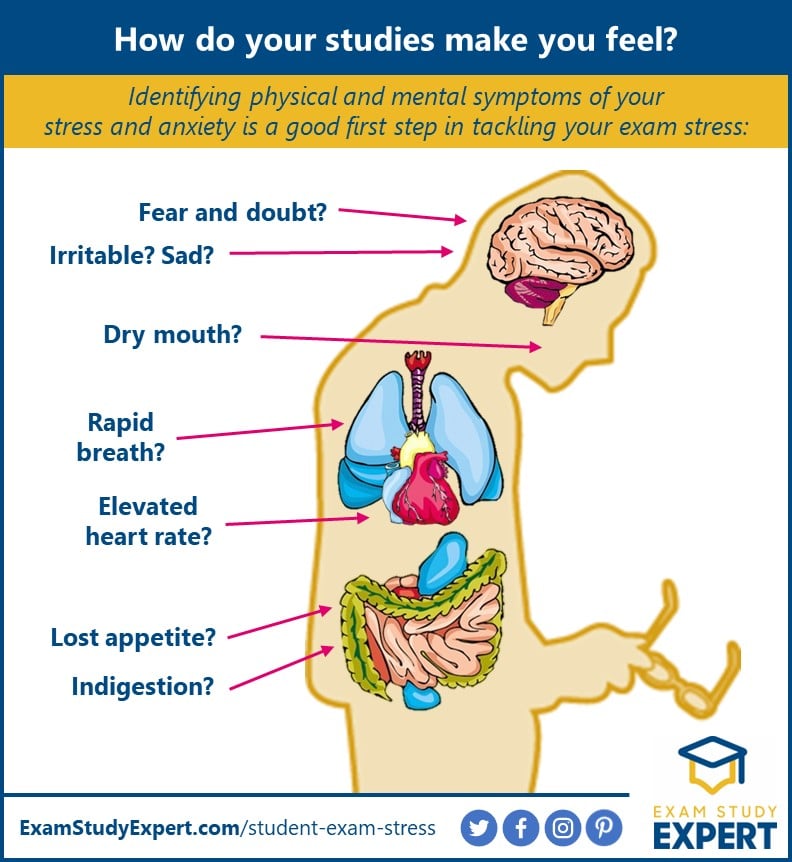
How to reduce your anxiety and stress during exam season: 18 practical tips
You’re in it for the long run: until the very end of your last exam.
So it’s really important for every student with upcoming exams to equip themselves with a fully-stocked arsenal of effective anxiety management techniques!
Luckily for you, we’ve got 18 practical tips for reducing your exam stress and anxiety right here. And they tackle everything from finding calm, managing expectations and keeping perspective to staying healthy for your exams.
Let’s go relieve our stress!
Part 1: Exam stress tips for when you need to find calm
You don’t have to control your thoughts. You just have to stop letting them control you.
Dan Millman, self-development author
About half of college students say they felt overwhelmed with anxiety at least once in the last 12 months (source: APA). So remember, you’re not alone.
A quick note if you’re feeling a bit scared right now: try a site called Living Life To The Full – built by doctors, and offering free Cognitive Behavioural Therapy materials to help a range of issues. It has a “panic button” on its homepage which takes you through a series of steps to find some instant calm. Or more seriously, if you think you might be a danger to yourself or others, here’s a list of places to get help in your country.
Then when you’re feeling a little steadier, here are 5 top stress management tips to calm your exam anxieties:
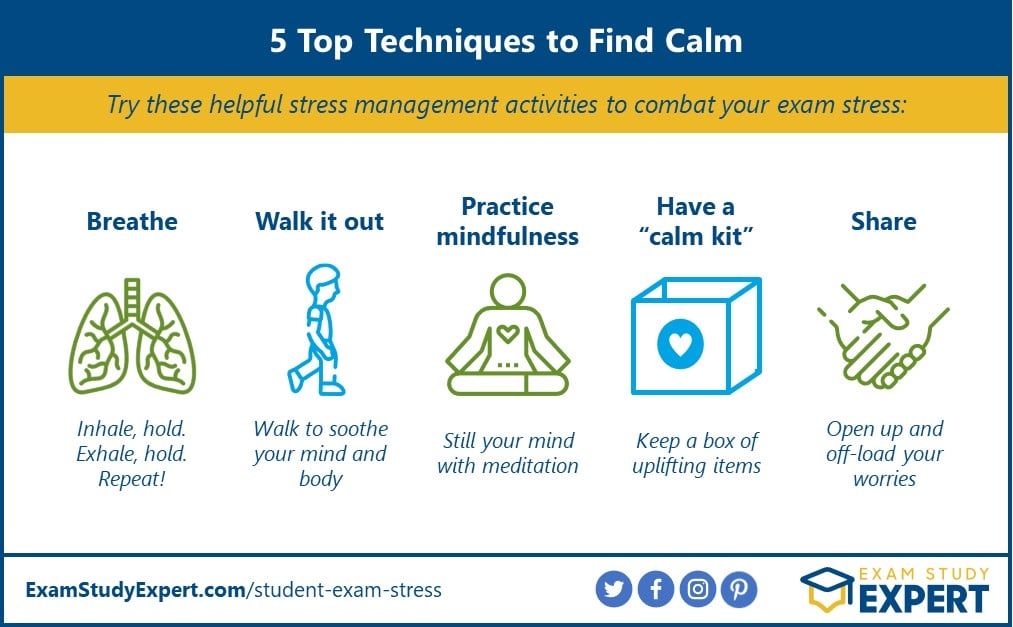
1. First, I want you to breathe … ahhh
Scientists have shown that we often think about the interplay between mind and body in emotions backwards. We intuitively think we run away from danger because we’re scared of it.
In fact, intriguing experiments indicate that we may have got this the wrong way around: the physical reaction comes first (the running away), and the emotional response comes as a reaction to the running. (This is a simplification of a complex, nuanced debate.)
So trick your brain: make it think it should be calm.
Breathing is a great way to do this.
One breathing exercise I like is “square breathing”. It’s apparently taught in elite armed units, where there is often a need to find calm under conditions of extreme stress:
- Inhale for 5 counts … Hold for 5 counts
- Exhale for 5 counts … Hold for 5 counts
- And repeat
It’s “square” because there 4 stages of the same length, which you can imagine as travelling the four sides of a square. Breathe slow enough that you feel relaxed, but not out of breath. Depending on your lung capacity, you might want to go for more or less counts.
Regular practice with slow breathing exercises has even been shown (in this case, over a 3-month period) to improve the way your body functions.
2. Find peace in your pace … as you walk it out
Walking is another great way to trick the brain into thinking that there’s no reason to be afraid.
A good walk can have a very soothing effect on the mind and body.
There’s something about the combination of light exercise, getting the body moving in a calm rhythm, the fresh air and (if you’re lucky enough in where you’re walking) being surrounded by nature of some sort – birds, trees, grass – that helps stress melt away.
And as a side benefit, walking is also said to give you a boost to creativity and problem-solving. Charles Darwin apparently thought out his Theory of Evolution on a series of long walks. The short walk I take every morning is when I come up with some of my best ideas or structure my existing thoughts better. There’s good research evidence from Stanford researchers that Darwin and I are not alone in finding that a walk boosts our creativity. Check out this TED talk from the same researcher, Marily Oppezzo too.
So you’ll come back to your desk calmer, maybe with fresh ideas and inspiration to bring to your work.
3. Practise being mindful … to learn to quieten your mind
Mindfulness is the art of being focused in the moment. It’s being able to still the incessant chatter of our brain and have it rest in the present, not ruminate on the past or dream / worry about the future.
An ideal way to practise mindfulness is meditation, which has become increasingly popular in recent years. In fact, high achievers in all walks of life – from businesspeople to athletes – find that meditation brings them more emotional balance, less stress, and more focus, among other things.
To find out more or begin your meditation journey, there are some good apps you can get started on for free. But I personally wholeheartedly recommend Headspace. It’s my go-to app for a daily dose of calm – I’ve been using Headspace for years, typically most days. I also recommend it to many of my coaching clients and at talks in school.
Headspace has some fantastic stuff specifically for students, including exam stress and test-taking anxiety. They’ve also got some wonderful sections on content (stories / soundscapes) to help you sleep, and even curated focus music playlists.
4. Have a calm kit to hand … for the perfect stress antidotes
If you’re someone who struggles with stress regularly, then this exam stress management tip could be perfect for you.
A “calm kit” is a little home-made collection of items that you know will help to steady and soothe you, and reduce your stress, all in a handy portable box.
What you include is personal. So take some time to think about things that make an instant wave of calm or joy wash over you. But here are some ideas:
- Some photos of favourite happy or silly memories to make you chuckle and remind you of the world beyond the library
- Something soft and furry to hold, if you’re not lucky enough to have a real live pet on standby
- Something sweet (and chocolatey?) to eat
- Your favourite calming or uplifting song on an old iPod (perfect for a dance break)
- A few bags of your favourite herbal tea
- A message of encouragement from some of your favourite people – they know you can do it!
- Some uplifting and inspirational quotes (about exams, stress or making progress) to perk you up
5. Share what’s going on for you … because opening up can be really helpful
Is there a friend or family member who you can off-load to? You’re looking for someone who makes you feel warm and safe, and who will have the time for you when you need it.
Talking things through – all your frustrations about revision, subjects you’re struggling with, fears about exam day – with people you trust can be a great way to cope with your exam anxiety.
That’s because it offers a great balance between a) bottling up and suppressing how you feel (not good) and b) melting down before the whole world (also not good).
Sharing your feelings can help you to regain a sense of control over your emotions. This allows you to come to terms with things and consider different perspectives on your problems.
The purpose of talking isn’t to solve all your problems. You probably won’t get many, or even any, solutions from a good conversation about how you’re feeling, but don’t worry. Just the act of talking everything over can be very therapeutic.
What if that’s not an option?
If you’re not lucky enough to have someone like that in your life, consider seeking out a listening service. Maybe your school or university campus has a counsellor or listening line. Or try one of the free, non-judgemental listening lines that exist around the world.
And of course, you may decide you need to take this to its next logical step, and see a professional counsellor or therapist for more specialist support. If you’re not sure where to start, talk to your school / college nurse, or your family doctor.
Part 2: Exam anxiety tips for when you ask too much from yourself
I do not try to dance better than anyone else. I only try to dance better than myself
Arianna Huffington, co-founder of the Huffington Post
One of the biggest causes of exam stress and anxiety is expecting too much of yourself.
Strong students often have very high standards for themselves. A history of achieving well, often causes students to push themselves to maintain or even exceed past successes.
Alternatively, you might feel you’re getting left behind by your classmates, feeling under pressure to catch up. Again, you might push yourself harder and harder to deliver these results.
A bit of incentive to work is no bad thing in moderation, as part of a balanced lifestyle. But it’s easy to let things spin out of control, so use these next four tips to keep your exam prep and expectations realistic and healthy:
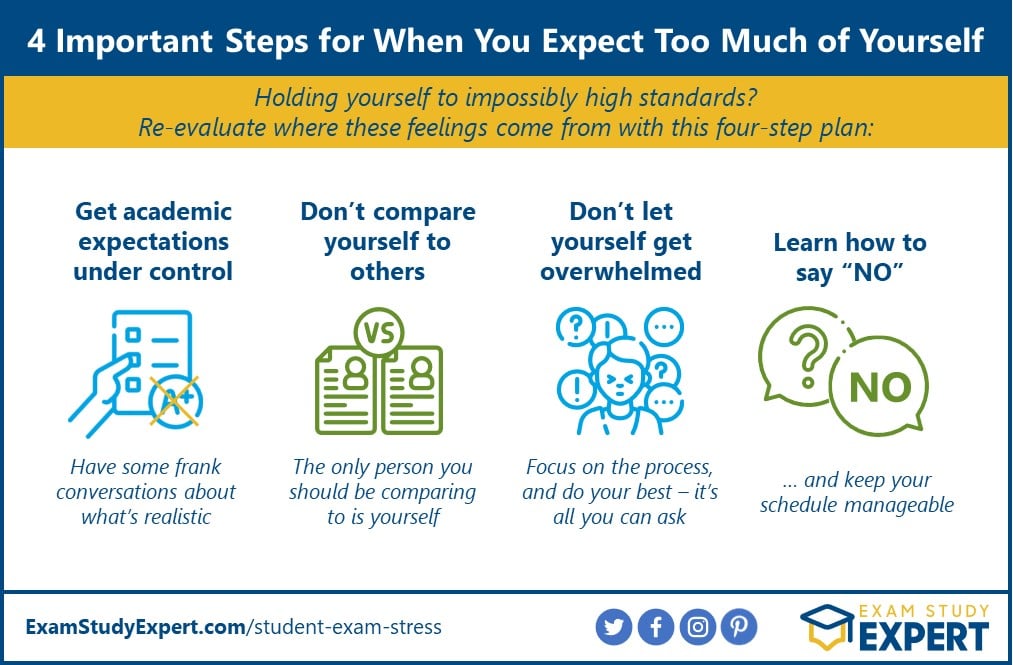
6. Manage expectations … … and cut them down to size where you need to
It’s helpful to take a moment to size up where the expectations are coming from, so you can act accordingly.
Are you holding yourself to the high exam prep standards or grade expectations currently causing you stress? Or are you feeling pressure from your teachers, friends, significant other, classmates, parents … and/or others?
Here’s an effective exercise to help you reduce your exam stress and anxiety: but you’ve got to be honest with yourself!
Combating exam stress: Activity 1
Simply grab a piece of paper, and create a chart of the people you think have expectations (yourself included!), what they are, whether they are realistic, and how much you care about what they think.
Here’s what it might look like:
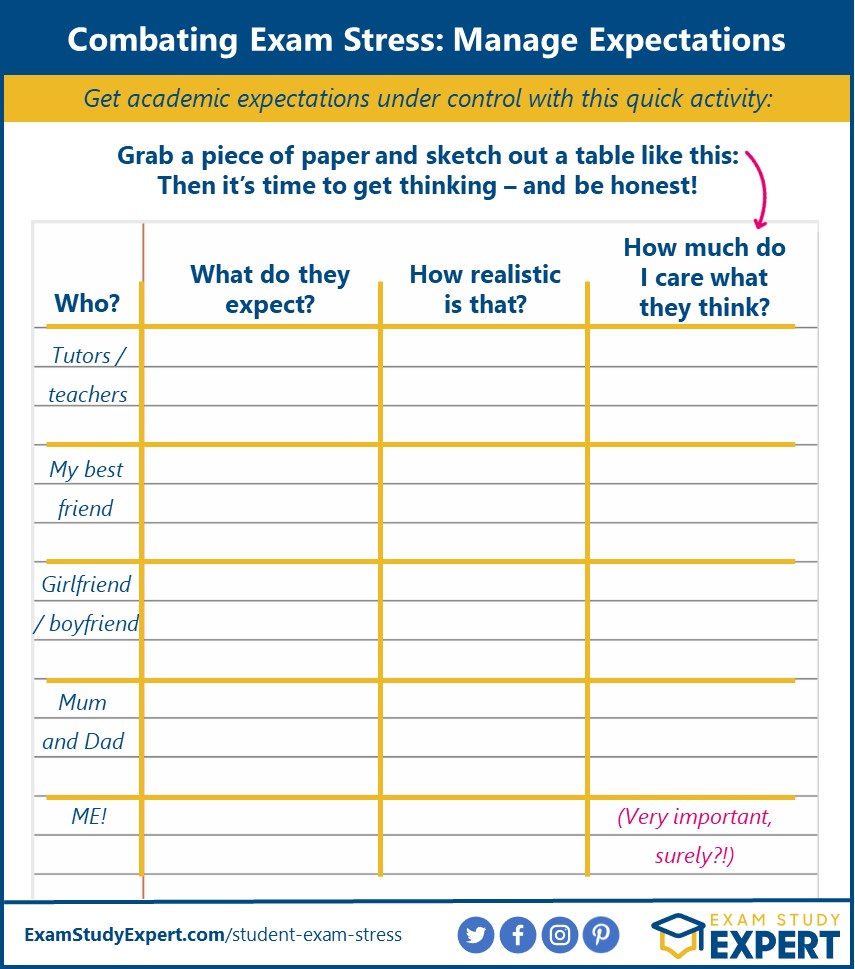
Now take a critical look at each row of your table:
- If the expectations are realistic, great.
- If the expectations are unrealistic but you don’t really care what that person thinks, that’s also OK.
- But where the expectations are unrealistic AND you care about what that person thinks, you’ve got the biggest problems. Mark these with a star.
For the starred rows, consider having a conversation with the person in question. Explain the situation, and the counterproductive consequences their expectations are having on you:
- “I think you want me to achieve [x] and that makes me feel [y], which is making it harder to get my work done”
In my experience, these conversations usually go well. If they care about you and your success, then they will want to do what they can to help.
The worst culprit of all for unrealistic expectations can often be ourselves. If that’s the case, try tips 10-13 about keeping things in perspective. And don’t be afraid to cut your goals down if it will take a weight off your shoulders and let you study in a calmer, more positive frame of mind.
7. Don’t compare yourself to others … become an island
No man is an island, but there’s something to be said for becoming one during exam season – at least in terms of reducing any exam stress and anxiety about your study progress.
Now, I don’t mean cutting off social ties!
You should still have study groups and collaborate on understanding topics and solving problems, of course.
I just mean that when you hang out with your course-mates, you don’t let them talk about how many hours of studying everyone is doing. Or brag about the progress they’re making, unless you find that sort of thing spurs you on. (Personally, I hated this sort of thing, and come exam time, would actively avoid friends I knew couldn’t help but have these conversations!)
And if you’re smart about revision, you’ll know that studying effectively isn’t about putting in the most hours anyway. It’s about using the right techniques to maximise your memory for exams.
Just remember that the only person you should be comparing yourself to is who you were yesterday, or last week, and how you’ve progressed since then.
8. Don’t let yourself get overwhelmed … all you can ask of yourself is that you do your best
Many students struggling with exam stress or anxiety become overwhelmed and end up too stressed to work (or can work, but is very unhappy about the process).
And that’s exactly what we want to avoid. It won’t help you to prepare confidently for your exams or find the motivation to keep studying.
If you’re feeling overwhelmed by your revision to-do list, take a deep breath (like Tip #1) and try one of these three strategies:
- Break it down
- Block out the bigger picture for now (it’s not helpful) and zoom in on something that feels manageable
- Focus in on that small area of what you need to achieve. Try to make some tangible progress on that area first … and then keep taking baby steps. Congrats: you’ve found your momentum!
- Set the right goals
- Don’t let a mountain-sized goal give you altitude sickness. Check out our guide on how to set realistic study goals for more info, but here’s the TL:DR:
- While you want to be stretching yourself, you don’t want to stretch so far that you snap. If your goals are too lofty, consider reigning them in.
- Focus on the process, not the result
- Make sure the mini-goals you set each day are 100% in your control to deliver. “Process goals” are perfect for that.
- Think in terms of the time you’re going to spend on something, not on what you want to achieve.
9. And learn the magic word … “NO”!
It’s natural to want to say yes to everything that comes our way.
Carpe diem! Live life to the full! YOLO! FOMO! Don’t want to let anyone down-o!
But – oh no! – before you know it, your schedule is rammed, you have too many plates spinning, and things start to fall. It’s a recipe for an overwhelming exam season.
So, learn to say NO. Keep your schedule realistic, with plenty of time for studying, sleep and rest.
Be strategic in the invitations you accept, the extra classes you go to, the hobby projects you undertake. Focus on the things you think will either a) have the biggest impact on your long-term life goals or, b) give you the greatest happiness and fulfilment in the here and now.
Less can sometimes be more. Better to have a more manageable schedule, do the things on it well, and feel good about life, don’t you think?
Part 3: Exam stress tips for when things get out of perspective
The difference between a mountain and a molehill is your perspective.
Al Neuharth, businessman and newsman
Our next set of student stress management tips are all about keeping things in focus, and not letting the way you’re looking at things spin out of control.
So use these next four tips to remind yourself of the world outside your exam stress and anxiety:
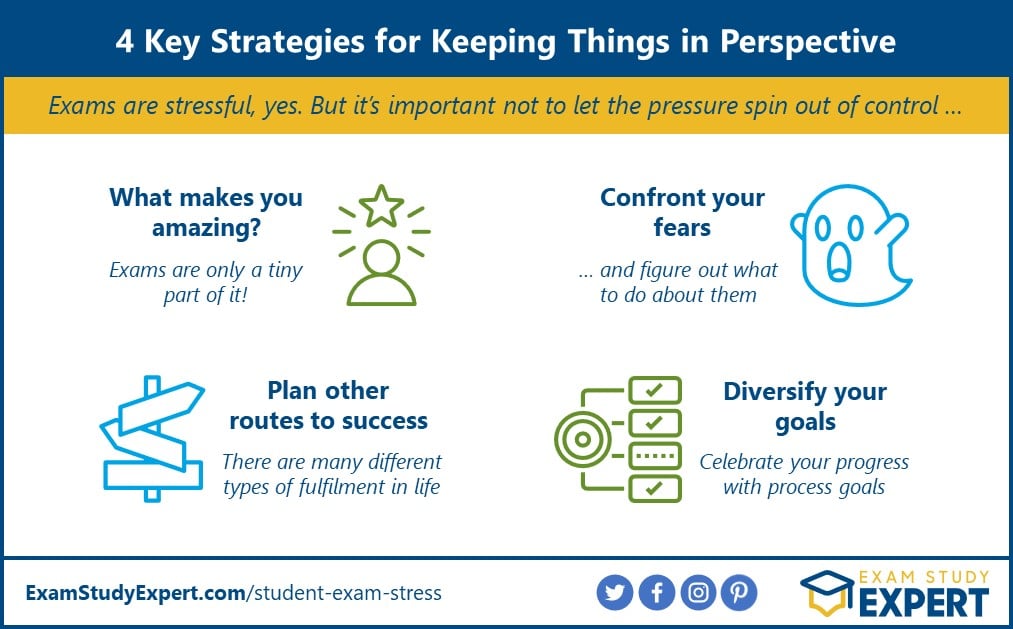
10. Remember: your exams are only a tiny proportion of what makes you amazing
As Exam Study Expert readers, you’re all rounded, complicated, messy, unique and brilliant people, with more talents and quirks than I can possibly imagine.
I know that’s true. You should all know it too.
So, don’t think for a moment that the results of an exam:
- Measure your quality as a person (they can’t)
- Demonstrate your self-worth (they don’t)
- Define who you are and what you will be (they won’t)
Ask yourself “What makes me amazing?“, and remember all your qualities that have nothing to do with your studies:
- Your humour and good-naturedness
- Your kindness and humanity
- The people you make smile
- The talents you have on the sports pitch, the stage, the music room; in words or in paint
What’s an exam got on any of that?
11. Don’t forget: academia is not the only route to success
One of my favourite tricks for getting students fired up and motivated is to ask you to come up with a list of reasons why your studies are super-important to you. What they mean for your plans for the future.
But I’ll let you into a little secret. There are lots of routes to success, happiness and fulfilment, and many of them are not academic.
Entrepreneurship. Creative success. A chance offer via an old contact. A hobby turned into a career. Life will throw you its share of opportunity if you keep your mind open to it.
I don’t know what your belief system or life philosophy is, but I’ve found it comforting to feel that everything happens for a reason. So, if you don’t achieve your study goals, and find yourself on a different path than the one you intended, perhaps there’s something even better down that path that you can’t even imagine.
12. You should: confront your fears before they confront you
Legendary author and entrepreneur Tim Ferris teaches an exercise called “fear setting”, which he adapted from even more legendary Roman philosopher Seneca the Younger, and which I’m going to adapt for you again today.
The idea is that we can bring our fears to heel by meeting them head-on, and carefully rationalising the implications of the outcomes we worry about.
Here’s how my “fear setting for students” version goes:
Combating exam stress: Activity 2
Gran a piece of paper, and divide it into two columns.
- On the left write down all of your worst fears about the consequences of not hitting your study goals
- On the right, think through all the options that you could actually do if that scenario came to pass.
Here’s an example I made up to show you the sort of thing I mean:
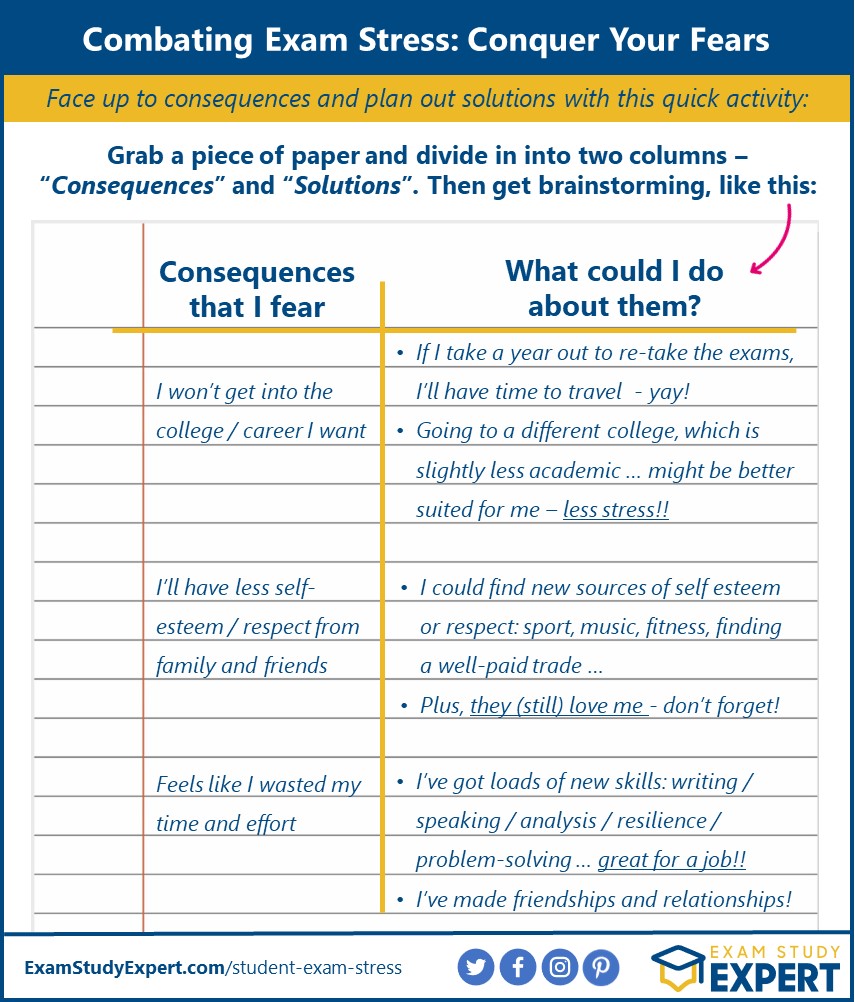
With a bit of luck, spending some time digging into your fears should reveal that they’re not quite so scary after all. In fact, some outcomes may even have a silver lining.
This technique has been tried and tested over thousands of years, and has been found time and time again to be effective by those who use it. So if exam anxiety is holding you back, I urge you to set aside half an hour to work through this exercise properly.
13. I recommend: having alternative ways to succeed every day
… so that if one goal isn’t going how you intended, there are others you can still take pride in.
I think there are three main ways to achieve this in studying:
- Take on multiple topics a day
- Don’t just do the same thing all day. Mix it up and look at different subjects or disciplines. If one’s not going well, hopefully you can still take satisfaction from progress in a different area.
- And you might benefit from “interleaving” if you’re studying maths or science.
- Have “process” goals for your studies
- Like simply sticking to your routine! You may have had a ‘mare of a day trying to get your head around something, or been writing at a painfully slow rate, but at least you can take pride in how you stuck to the schedule and worked for however many hours you’d planned.
- Have non-study goals altogether
- Maybe you’ve got a side goal to do with advancing your fitness goals or practising a skill or talent.
Once you’ve diversified your goals, you’re no longer putting all your eggs in one basket. So, if things aren’t going quite to plan in one area one day and you’re feeling the weight of exam stress and panic, you can still take comfort from the fact that you’re making progress in another area.
Part 4: Exam anxiety tips for when you forget to look after yourself properly
Grant me the serenity to accept the things I cannot change, courage to change the things I can, and wisdom to know the difference.
Reinhold Niebuhr, theologian
(Thanks Reinhold: I’ve always loved that quote, and it seems perfect for reducing (exam) stress and anxiety!)
For the final section of exam stress management tips, it’s all about self-care.
It’s tempting to overlook the need for self-care when you’re worrying about your studies and those looming upcoming exams. But as the exam stress levels creep up, it only gets more important that you continue to look after yourself.
So take these final five exam stress tips on board and keep your mind and body in peak condition for handling everything that exam season throws at you:
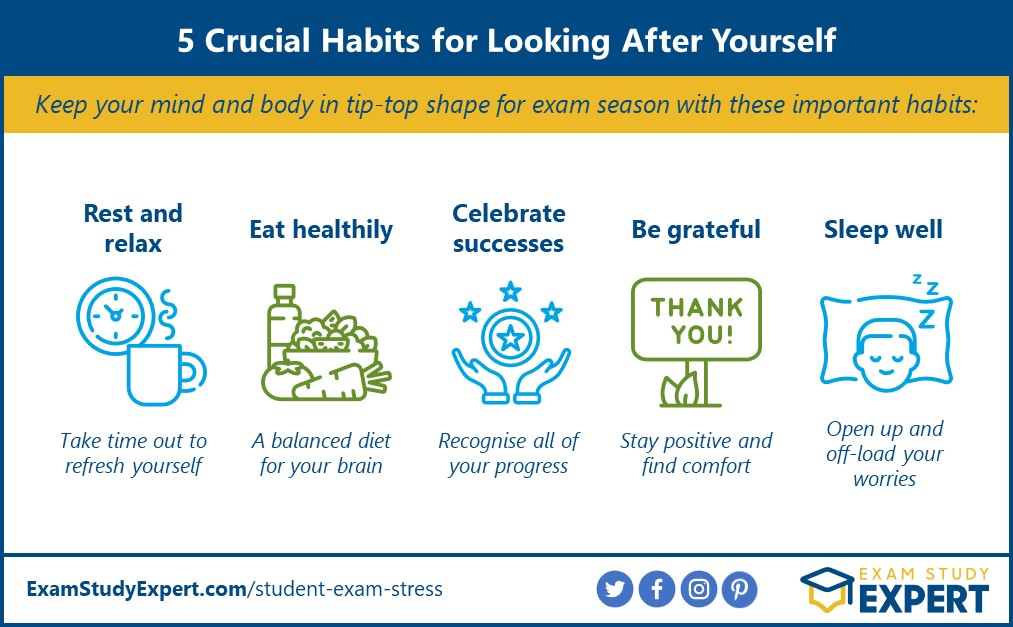
14. Make proper space in your life for quality rest and relaxation time…
None of us is a robot. You can’t work all day every day for weeks on end without slowing down, or even grinding to a halt altogether. You need to take time out to catch your breath.
And I don’t just mean 10-minute breaks for a cup of tea, or an hour out to grab some lunch.
I mean making a deliberate and guilt-free decision to walk away from your desk for an extended period to let your hair down a bit. Maybe give yourself Sundays off, or never work past 6pm, or take 3 afternoons a week out – or all three!
This is your time. Do things that help you let go and refresh your body and soul:
- Play sport
- Socialise with friends
- Make music or dance
- Worship
- Walk in nature
- Exercise
- Play video or board games
- Watch your favourite TV show
- Read a book
Make it quality time: if you’re settling down to read or watch TV, make sure it’s a book / show you love. Plan ahead to help with this: pre-record your favourite shows, have a cracking book ready to go on your shelf, or have a date with a friend in the diary.
This is your treat time – enjoy it.
15. When it comes to your body, you get out what you put in
Make sure you’re doing the right thing in terms of a balanced, nutritious diet: plenty of fresh fruit and vegetables, staying well hydrated. You know the drill: but it’s easy for a student under lots of exam stress to forget to take care of the basics.
In particular, watch for caffeine. Anxiety is essentially a state of heightened arousal, and caffeine only serves to increase that arousal further, which may not be productive.
If you’re medicating with caffeine because you’re not sleeping well, try (as best you can) to fix the problem at its source and get a better night’s sleep (see tip 18).
Maintaining a good exercise routine has also been shown to significantly reduce students’ anxiety about upcoming tests, so go get a sweat on! If you’re not a natural athlete, find something you enjoy: a weekly game of badminton, or a swim in a lake, or even a regular hike in the hills.
16. Celebrate your successes with a well-deserved pat on the back every day
If you’re making progress (even – perhaps especially – if it’s not as fast as you’d like) it’s vital you pause from time to time to recognise what you’re achieving:
- If you have a list of topics to learn:
- Be sure to mark your progress against the list and enjoy the feeling of gradually working through it all.
- Keep it glass half-full: don’t get overwhelmed by how much there is to do, focus on where you’ve come from and the fact you’re moving in the right direction.
- You could say a few congratulatory words to yourself in the mirror when you go to bed, or when you wake up in the morning – and perhaps even include a bit of a pep talk about your plans for the next day.
- Positive self-talk can feel a bit silly if you’ve never done it before, but many people swear by it.
- Some people adopt a regular journaling habit, which includes acknowledging what was achieved in the past day and setting mini-goals and priorities for the day ahead.
17. Practise gratefulness for the good things in your life
Even when life sucks, the act of saying “thank you” and acknowledging what there is to be grateful for is a good way to stay positive.
So remember to say “thank you” for the good things, big and small, important and everyday: even (especially) if not everything feels rosy and you’re having a rough time with exam season stress and anxiety.
Do a happy dance, and groove around the room – go on, I dare you!
I know:
When you’re stressed and it feels like the world doesn’t care, it can be difficult to think of things to be thankful for! If it’s difficult to find gratitude, perhaps you’re most in need of trying. Maybe you find at least a little comfort from your exam stress in:
- A particular person who makes you feel safe and happy
- A pleasant place
- A pleasing piece of art or architecture you pass regularly
- A nearby calming natural space: a tree, a pond, a stream
- The food you have enjoyed today
- The music you love listening to right now
- The personal abilities and qualities you quietly know you have
Some people incorporate gratefulness into their daily journaling habit, so they always start or finish the day with a ritual of finding thankfulness, no matter how tough things are getting.
18. Sleep well: finish early for the evening to help get a good night’s sleep
If you’re working right up to bedtime, chances are, you won’t get to sleep for all the study thoughts buzzing and fizzing around your brain. We don’t want that.
Getting plenty of sleep is crucial for being able to study effectively and keeping your memory in tip-top condition for your exams. So, try and knock off at least an hour before you actually want to go to sleep.
If you’ve been operating at high intensity during the day, you might be feeling the need to unwind and decompress. So develop a good night-time routine: take a warm bath, read something restful, listen to some calming tunes, and maybe have a soothing hot drink – something without caffeine like herbal tea.
Sleeping well is especially important if you’re trying to learn and memorise lots of information: you’ve might have heard we consolidate memories in our sleep, and it’s absolutely true. So, make sure you create the time in your schedule to get a peaceful night and don’t skip the slumber.
What to say to comfort someone who is stressed about exams: advice for parents and friends
What can you say to a student in the throes of an exam stress panic? How do you comfort them effectively?
It’s easy to feel stuck on the outside of a panic zone, especially if you’re far away from the student in question, with only your phone to help.
So to help you help your stressed student, here are my top six recommendations for practical, comforting activities and what to say:
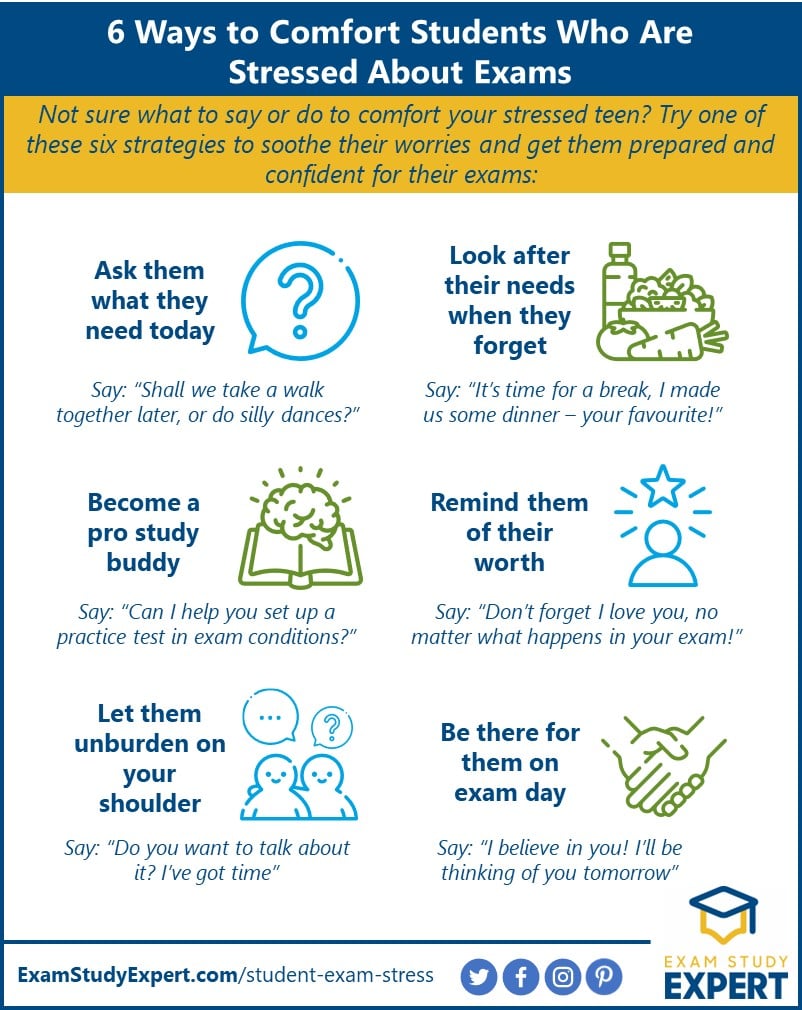
Whether you live together, nearby or far apart: in today’s world of video calls you can do almost all of these activities together. So let’s go comfort some stressed students!
1. Ask them what they need right now
Don’t assume that you know best what your stressed ball of teenager needs right now: ask them!
We’re all different, and whilst some people might want to share their exam stress and fears over a hot drink, others might just prefer some quiet company whilst they take a fresh air break.
Or, perhaps the best thing you can offer is their favourite home-cooked meal this evening, and some company for a cheesy film. Because taking well-deserved breaks to unwind is a crucial part of every effective study schedule!
And if your student is too stressed to know what they need, point them in the direction of this article. Why not offer to work through some of the exam stress activities above together?
Above all though, don’t be pushy. You know your teens and friends well. It might be difficult but try to support them in a way that’s all about them (not about you).
2. Look after their needs (especially when they’re in the study zone)
This one goes hand-in-hand with my suggestions from Part 4, right above. One of the best ways to comfort and support someone who is stressed about their exams is to make sure they are looking after themselves.
To be effective at studying, revision and exams it’s really important that your student “sharpens the wheel” – i.e. keeps ALL their tools in optimum condition. And that means:
- Eating well, with a balanced healthy diet: make sure they’re not skipping meals with gentle reminders – and steaming bowls of tasty food.
- Getting enough sleep: all-nighters can be tempting when it comes to last-minute cramming. But it’s just not helpful: a good night’s sleep is the best medicine for their brain before an exam.
- Encourage a healthy evening routine: stopping revision with plenty of time to unwind before bed, and getting a full 8-10 hours sleep, especially the night before exams!
- Getting enough exercise: there’s nothing like some fresh air and a walk to blow some exam stress and cobwebs away.
- So why not get outside with your friend or teen, and keep them company – it’s a double win for their needs!
- Taking plenty of breaks: encourage time to wind down by suggesting activities together – from mindful meditation to cooking dinner. Don’t be pushy, but don’t give up on them if they say no once or twice!
- It’s another great way to ensure they’re not keeping their exam stress secretly bottled up and that they’re getting enough socialising time.
3. Let them unburden their worries on your shoulder
One of our top pieces of advice for stressed students is to share their exam stress (you might have spotted this above!).
So, let your stressed friends and teens know that your shoulder is wide open and available:
- For a cathartic sob: keep the tissues handy and remind them that these exams are not the end of the world
- As a camping ground for enacting practical calming strategies (check out the list above!)
- For comforting, gentle hair-stroking and a big old hug
- To lean up against theirs whilst you do try out a Headspace mindfulness meditation together
- For a Q & A retrieval practice revision session – be the ultimate encouraging study partner, and put their exam fears aside by quizzing them on their knowledge
If you’re getting worried about how challenging your friends or family are finding their exams, or about their anxiety and stress levels, it could be a good idea for them to talk to a professional.
Now, that might be a mental health professional or one of their teachers, depending on what kind of help and support they need right now. Be gentle – this can be a hard topic to broach, but remind them that there’s no shame here.
4. Become a pro study buddy
There are plenty of ways to comfort and support your student by helping them to study effectively – whether you’re a friend, sibling or parent!
A key part of the following suggestion is knowing specifically what’s worrying them about their exams. Once you’ve gathered that info, you can help by making their exams feel more manageable:
- Helping to set up a quiet, distraction-free place to study – a dedicated space if possible.
- Noisy siblings or friends? Noise-cancelling headphones could be the perfect gift for a calm, stress-free revision environment.
- Quizzing them on the subjects they feel most worried about – why not help them set up simple flashcards for revising with the Leitner method?
- Finding past papers for them, and helping to grade the papers afterwards
- Setting up practice exam conditions to alleviate any nerves about exam day – think: timed conditions in a quiet room, no study guides, the same equipment, and a past paper!
- This is a great way for students who are stressed about performing on the day to face their fears
- Encouraging setting up an effective study routine – it’s all about finding balance and avoiding excess stress.
5. Tell them you’re there if they need you, throughout exam season
Ensure that you make time for your stressed friend, sibling or child throughout their exam season.
One of the best ways to follow through on this promise is to ask your friend or teen “can I have a copy of your exam timetable?”.
It might be that you offer to take them to the exam hall and / or be waiting afterwards. If that’s not possible, with a copy of their exam timetable you’ll know when to call or text with good luck, words of encouragement and to let them know you’re thinking of them!
I’m sure you have a busy life too, full of your own stresses and work / studies – but be flexible. This is an important time for your friend or family member.
6. Remind your friend or teen of their worth
Exam results do not determine anyone’s worth! It’s a delicate balance:
It might not seem like it to students in the midst of exam stress and panic, but these exams are not the end of the world. And yet, these exams are likely one of the most stressful things your student has ever dealt, complete with higher stakes than ever before.
So don’t forget to do these three important things to comfort someone who is stressed about their exams:
- Remind your friends and teens (as obviously as you need to get the message through!) that you’re still going to love them, even if these exams don’t go to plan.
- Try out one of my exam stress activities above (#4). Consider the pressure your own expectations are putting on your student. Encouragement to pursue a top university or high-powered career path can feel a lot like pressure when it comes to exam crunch time.
- Tell your friend or teen what you admire about them (leave exams out of it!), and how much you value your relationship. Remind them of a silly time you had together recently!
Why not help them plan out an exciting Plan B? Having a safety net is great reassurance that there’s still a life ahead for them even if they don’t get the grades.
Recap: what to say to someone who is stressed about exams
Still not sure what to actually say?
Perhaps you’ve typed and erased a message several times already, and feel like “It’s gonna be OK” just won’t cut it? Or you’ve said something you thought would be helpful, and instead it’s all slammed bedroom doors and stomping feet?
If you’ve taken all the advice above on board you, might already have sent a comforting text – or given a big hug.
But if you’re still not sure exactly what to tell someone who is stressed about their exams, why not try one of these to start with:
- “It sounds like you need a break. What would you prefer to do right now: wild dances together to your favourite song, or sit outside together for 15 mins and chill?”
- “Don’t forget that you’re still my favourite _____ and I love you, no matter what happens in your exam!”
- “Would you like to talk about it?”
- “I’ve heard mindfulness and meditation really help with stress and anxiety. Do you want to try out a video together? It might be fun!”
- “Let’s go for a quick walk! You tell me about your exam worries and I’ll tell you mine”
- “That sounds really hard and stressful. How about I quiz you on _____ later, then we can watch a movie?”
- “Don’t forget to take some deep breaths and then take a break!”
- “Have you talked to your teacher about how much you’re struggling with [topic]? Would it help if you got a tutor to support you with this exam?”
Quotes about exam stress to uplift every anxious student
Looking for some epic, inspiring or stirring quotes to pull you out of your exam stress funk?
We’ve featured a few on this page, which you might have noticed, from famous minds: authors Dan Milman and Arianna Huffington, businessman Al Neuharth, and theologian Reinhold Niebuhr.
But if they’ve not quite calmed your mind, why not browse one of our five popular quote collections? I recommend you start with inspirational exam quotes, which have been curated with exam stress in mind!
- 49 Inspirational Exam Quotes – perfect for stressed students with deadlines looming
- 41 Study Motivation Quotes – great for getting fired up for a study session
- 70 Empowering Quotes about Procrastination – ideal for all of us who put things off!
- 55 Uplifting Quotes about Making Progress – just what you need when there’s lots to do
- 63 Growth Mindset Quotes – perfect for getting into the ideal study mindset
Feeling better? I hope so!
With any luck, you can deploy these tips and exercises to help dramatically reduce the exam stress and anxiety you feel in the lead-up to your exams. Or at least, subdue it for long enough to get some work done.
We love to hear from our readers: have you found a stress-relief tip here that worked for you? Let us know in the comment section below!
And if you’re looking for more exam tricks, tips and techniques to smooth the path to exam success, I’ve created just the book you need: Outsmart your Exams! It’s full of science and advice to keep your exam stress at bay. Perfect!
Wishing you the very best of success in your exams: you’ve got this!

By William Wadsworth, the Cambridge University trained cognitive psychologist and specialist in how to study smarter, not harder. He leads the world’s largest research study on use of effective learning strategies, is regular exam prep expert for The Times, and hosts the Exam Study Expert podcast, which has 1 million downloads to date.
Author Profile | About Us | Editorial Policy | Contact Us



Thanks for such fantastic content. It was beneficial. This helped me ace my tests.
Thank you! I don’t know what makes me stressed and anxious before exams. I study hard and really learn the material, repeat a lot, and practice at home, and show good results. But during the exam, I forget everything, and panic comes. I am epileptic and excessive panic and anxiety provoke seizures more often than usual.
I would like to remember these tips and apply them. Breathing practice is a good technique to calm myself. It gives me time to concentrate.
https://twu.edu/mtsc/resources-for-test-anxiety-study-skills-and-time-management/ What do you think about these articles about techniques of soothing and avoiding stress? The University Support Department advised me on these resources. The winter exam season is coming soon and I really do not want to repeat my failures again.
Hi Anna – exam stress is fairly common, but that sounds like a particularly rough position to be in. I took a look at some of the links on the page you mentioned in your comment. I think some of the linked resources are quite good (if a little long / overwhelming!), others aren’t great, to be honest. I do have some thoughts / ideas for you – but perhaps we could pick up the conversation over email? Just go to https://examstudyexpert.com/contact/ and say “hi” and I’d be happy to talk in a bit more detail 🙂
I am still worried
Studying can be really stressful – you’re not alone. If you want more help, feel free to drop me an email with a bit more background: what you’re studying, where, and what is it that you worry about the most. I’d be happy to make some more personalised suggestions that could help. https://examstudyexpert.com/about/contact/
its really very informative. its wonderful effort no doubt to release stress.